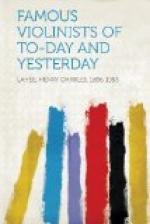Before he left Berlin he had worn down the end of his first finger to the nerve. This troubled him to such a degree that he had several operations for the purpose of removing it, but the result was not wholly satisfactory.
Emerging from his retirement in 1894, he went to Berlin again, and gave a recital in which he met with the most remarkable success. It was written at the time: “Mr. Burmester comes from an obscure town, unheralded, and, in the face of indifference, prejudice, and jealousy, conquered the metropolis off-hand. For nearly half an hour recall followed recall.”
The following season he created an equal impression in London, and shortly afterward in America.
His technique has been described as “marvellous, almost diabolical.” Difficult pizzicato passages and runs in thirds and tenths at top speed are but as child’s play to him. His left hand pizzicato is marvellous, and he makes runs in single and artificial harmonics as quickly as most violinists can play an ordinary scale. He plays harmonics with a vibrato (Paganini played a double shake in harmonics), and his staccato volante is developed to an astounding degree of perfection.
When Burmester played in London his success was at once attributed to Joachim, and he resented it, in view of the fact that he had been denied his certificate and had narrowly escaped musical suffocation at the hands of that great master. He had already made the same statement in Berlin, referring to the fact of his retirement to Helsingfors, and the development which he had acquired there in solitude.
This announcement brought forth a deluge of letters from “pupils of Joachim,” and in a couple of weeks Burmester wrote another letter stating that he did not know the Hochschule had as many pupils as those who had claimed Joachim as their teacher, and who were all unknown. “If one known pupil of Joachim,” he wrote, “will appoint a meeting to interview me on the subject, I shall be glad to continue it.” But the one known pupil did not come.
The complaint of Mr. Burmester, that the one idea at the Hochschule is technique, is not new by any means. In every school there are students with great talent, who find it difficult to subject themselves to the rigid discipline required by the teacher. It is the stumbling-block on which many fall. It is, nevertheless, a fact that without a solid technique the highest perfection in playing cannot be reached, and it is usually regarded as a hopeless case when the pupil antagonises the teacher. Many pupils are apt to try and run ahead of their technical ability, and do not find out their mistake until it is too late. The argument that Paganini was self-taught leads many a young violinist into error.
If Burmester is to be judged by his playing of the Beethoven concerto in Boston, good musicians will declare that Joachim was right in refusing the certificate, for while his technique was brilliant it appeared to lack foundation. Time may justify the stand which the young virtuoso has taken in opposition to his teacher, for he is still young and has time in which to develop. He has undoubted musical talent and great ability, but while he may be a celebrated violinist he can hardly yet be considered a great one, notwithstanding the furore which he caused in Berlin.




